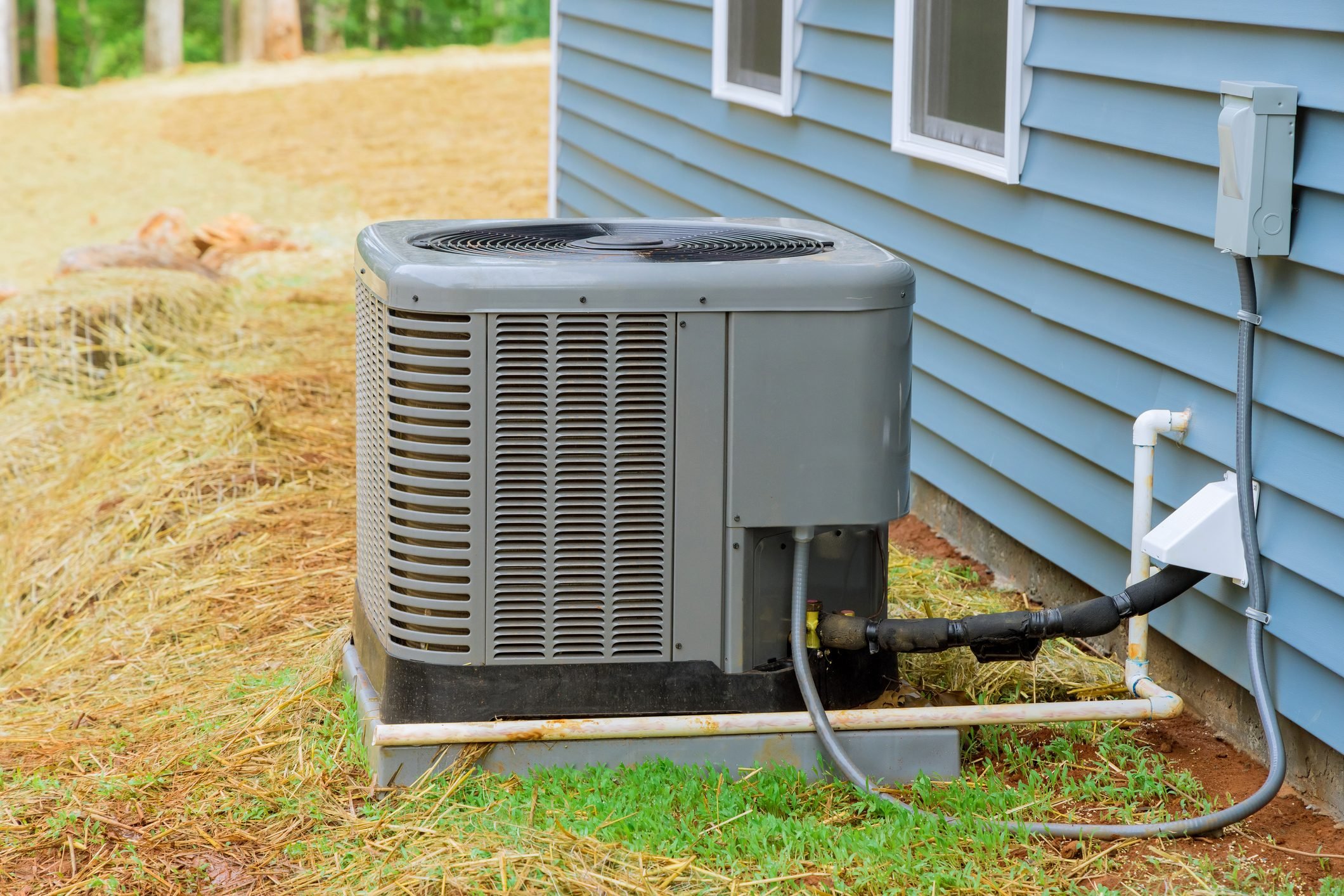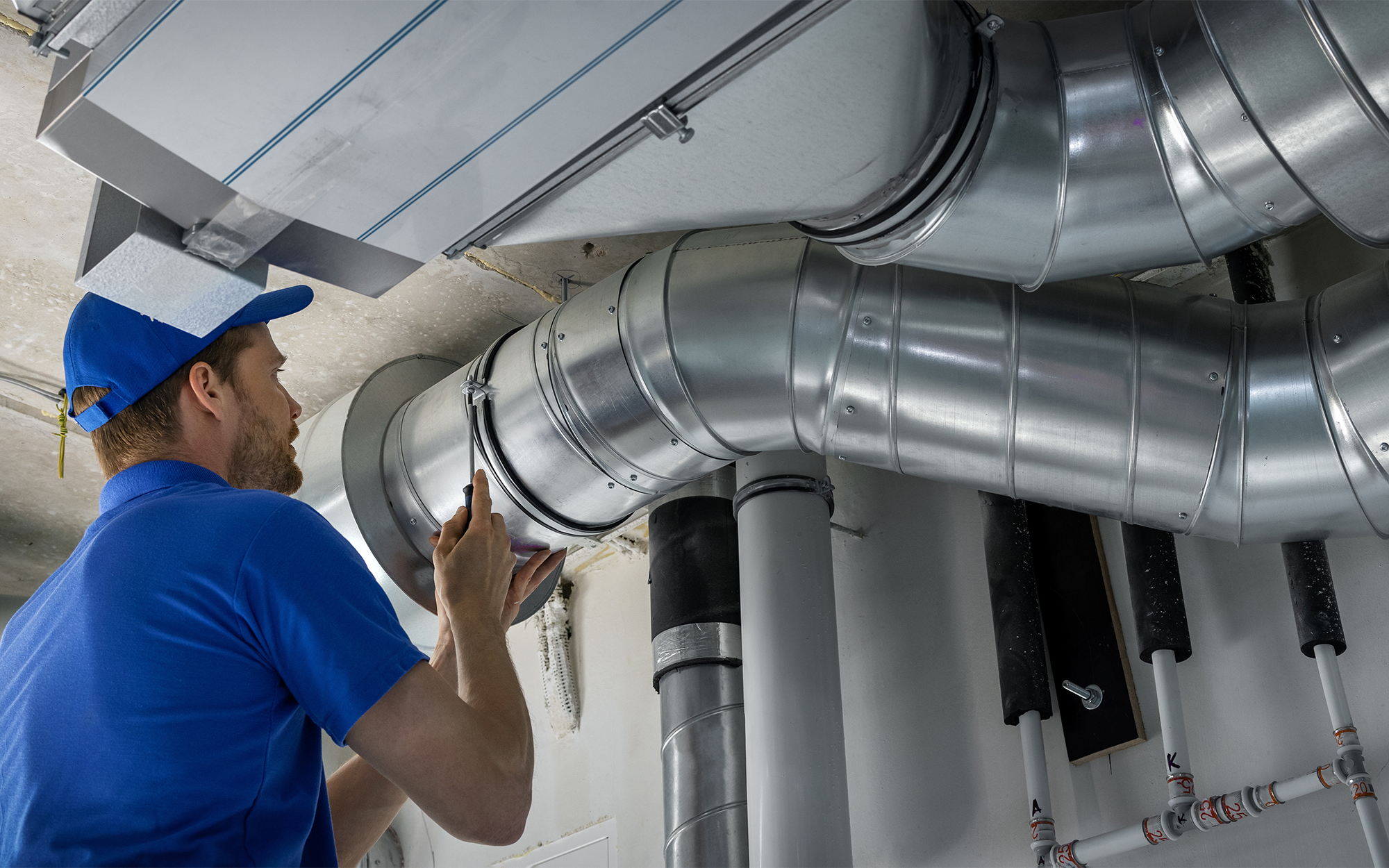Discovering the Vital Elements of an Effective A/c System
An effective HVAC system is built on a number of essential components that operate in consistency. Each component, from the thermostat to the ductwork, plays a necessary duty in maintaining comfort and power efficiency. Comprehending these elements is crucial for optimizing efficiency and boosting interior air high quality. As one checks out these components, the detailed connections between them disclose understandings right into boosting general system efficiency. What certain factors contribute most to this performance?
The Duty of the Thermostat in Heating And Cooling Performance

Commonly forgotten, the thermostat plays an essential function in the performance of Heating and cooling systems. This tiny gadget functions as the primary control center, managing temperature level setups and making sure perfect comfort within a room. By accurately picking up the ambient temperature level, the thermostat communicates with the heating, air, and ventilation conditioning systems to keep the desired climate
A reliable thermostat decreases power intake by turning on the heating and cooling system only when essential, thus preventing too much heating or cooling. Modern programmable and wise thermostats improve this performance better by allowing users to establish schedules and from another location readjust setups, adjusting to everyday regimens.
The positioning of the thermostat is vital; incorrect place can lead to inaccurate temperature readings, resulting in inefficient operation. Overall, a well-functioning thermostat not only improves convenience however also contributes considerably to energy savings and the long life of the heating and cooling system.
Recognizing the Importance of Air Filters
Air filters offer an essential feature in cooling and heating systems by guaranteeing that the air circulating within an area continues to be tidy and healthy and balanced. These filters catch dust, allergens, and various other pollutants, stopping them from being recirculated throughout the setting. By capturing these particles, air filters add to boosted indoor air top quality, which can substantially benefit owners' health and wellness, especially those with allergies or respiratory system conditions.
In addition, maintaining clean air filters improves the effectiveness of HVAC systems. Blocked filters can restrict airflow, causing the system to work more challenging to maintain desired temperature levels, leading to increased power usage and greater utility costs. On a regular basis changing or cleansing filters is an important upkeep action that can lengthen the life-span of HVAC devices. Inevitably, understanding the importance of air filters enables home owners and structure supervisors to take aggressive steps to ensure a well-functioning, reliable a/c system that advertises a comfortable and safe interior atmosphere.

The Capability of the Heating System and Warm Pump
Heaters and heatpump are crucial parts of heating and cooling systems, in charge of supplying heat throughout colder months. Furnaces run by heating air via burning or electric resistance, after that distributing it throughout the home using ducts. They generally use rapid home heating and can be sustained by all-natural gas, electrical energy, or oil, depending upon the system type.
Conversely, heatpump transfer heat instead than produce it. They draw out warmth from the outdoors air or ground, even in reduced temperatures, and transfer it inside your home. HVAC experts. This twin functionality enables warmth pumps to additionally offer cooling in warmer months, making them versatile alternatives for year-round climate control
Both systems require appropriate upkeep to assure performance and longevity. While heaters master extreme cool, heatpump can be helpful in modest environments. Understanding their distinctive capabilities aids house owners in picking one of the most ideal option for their heating needs.
Discovering the Cooling System
The a/c unit is a crucial part of a/c systems, available in different kinds to match various needs. Comprehending the efficiency ratings of these devices is important for making notified options about energy intake and price. This section will check out the varied types of ac system and clear up just how performance rankings impact efficiency.
Sorts Of Air Conditioners
While various aspects affect the selection of a/c systems, understanding the different types readily available is important for home owners and structure supervisors alike. Central air conditioning conditioners are made to cool down whole homes or structures, making use of a network of ducts for air movement. Home window devices supply an even more local option, perfect for tiny rooms or solitary rooms. Portable ac unit provide adaptability, permitting users to relocate the device as required. Ductless mini-split systems are another option, integrating the performance of central systems with the ease of zoning, as they call for no ductwork. Lastly, geothermal systems harness the earth's temperature level for energy-efficient cooling. Each type features distinctive advantages, making informed selections important for effective climate control.

Efficiency Scores Discussed
Comprehending effectiveness scores is important for picking the appropriate a/c unit, as these metrics give understanding into the system's performance and energy usage. The most typical score for ac unit is the Seasonal Energy Performance Proportion (SEER), which gauges the cooling outcome throughout a typical cooling season divided by the complete electric power input. A higher SEER suggests better efficiency. Additionally, the Power Performance Proportion (EER) is made use of for measuring effectiveness under particular problems. An additional essential metric is the Power Celebrity certification, which signifies that a system fulfills stringent power efficiency standards. By examining these scores, consumers can make enlightened options that not only maximize convenience but also lower power expenses and environmental impact.
The Significance of Ductwork and Air movement
Effective ductwork style and air movement monitoring play essential functions in the total performance and efficiency of cooling and heating systems. Proper ductwork guarantees that conditioned air is distributed evenly throughout a room, decreasing temperature level variations and improving comfort. Well-designed air ducts minimize resistance to air movement, reducing the workload on heating and cooling tools and eventually lowering energy intake.
Airflow monitoring entails purposefully putting vents and signs up to improve the flow of air. This prevents usual problems such as chilly or warm places, which can take place when air movement is blocked or inadequately balanced. Additionally, the best duct products and insulation can additionally enhance efficiency by lowering warmth loss or gain throughout air transportation.
An efficient ductwork system not just adds to energy cost savings but can likewise prolong the life-span of cooling and heating tools by decreasing unneeded pressure (HVAC experts). Subsequently, comprehending the importance of ductwork and air flow is vital for attaining peak cooling and heating system efficiency
Regular Maintenance Practices to Improve Performance
Routine upkeep methods are vital for making certain peak efficiency of heating and cooling systems. These methods include routine evaluations, cleansing, and needed repairs to keep the system running effectively. On a regular basis altering air filters is crucial, as blocked filters can block air flow and reduce efficiency. On top of that, professionals should inspect and tidy evaporator and condenser coils to avoid getting too hot and energy wastage.
Annual expert inspections are also advised, as experienced technicians can identify potential problems prior to they intensify. Lubricating moving components reduces wear and tear, contributing to a much longer life expectancy for the system. In addition, ensuring that the thermostat click here functions properly help in keeping ideal temperature control.

Often Asked Questions
Just how Often Should I Change My Thermostat?
Thermostats must normally be replaced every 5 to ten years, depending on use and modern technology developments. Regular checks are suggested to assure peak performance, especially if experiencing irregular temperature level control or enhanced power prices.
What Dimension Air Filter Is Finest for My A/c System?
The very best dimension air filter for a cooling and heating system varies by system design. Generally, it's vital to get in touch with the proprietor's handbook or inspect the existing filter dimensions to guarantee peak performance and air top quality.
Can I Install a Warmth Pump Myself?
Installing a warm pump individually is possible for skilled individuals, yet it requires understanding of electrical systems and regional codes. Employing a professional is advised to assure correct installment and perfect system efficiency.
How Do I Know if My Ductwork Is Reliable?
To identify ductwork effectiveness, one should inspect for leakages, step air movement at vents, evaluate insulation top quality, and evaluate temperature distinctions between supply and return air ducts. Specialist analyses can give thorough insights right into general performance.
What Are Indicators My Heating And Cooling Needs Immediate Maintenance?
Indicators that an a/c system needs instant upkeep consist of uncommon noises, inconsistent temperatures, enhanced power costs, unpleasant smells, and constant biking. Addressing these issues without delay can stop more damage and guarantee top system efficiency.
Air filters serve an important feature in Cooling and heating systems by guaranteeing that the air flowing within a room remains healthy and tidy. Additionally, maintaining clean air filters boosts the effectiveness of A/c systems. Ductless mini-split systems are another alternative, incorporating the efficiency of main systems with the ease of zoning, as they require no ductwork. Comprehending effectiveness scores is necessary for picking the ideal air conditioning unit, as these metrics give insight right into the system's performance and energy consumption. The ideal size air filter for a HVAC system differs by device design.